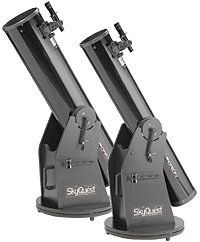
A First Telescope
If you already own and regularly use a telescope, you probably know what you want, hit the back button on your browser, this page is for the first time telescope buyer.
As for what telescope to buy, this depends highly on you. I would suggest learning a little about astronomy and telescopes before spending any money. Your local astronomy club will usually have many star parties, preferably at a dark sky site, go to them and look through the scopes there. You will learn much about what scopes work well and what to expect to see with them. If you ask each person what scope to buy you will get a different answer from each person... listen, learn and make up your own mind about what you will want.
Our club holds monthly beginner's star parties just for things like this. If you are in the Tucson area take a look at our calendar for the next one and a map of how to get there. You do not need to own a telescope to come!
If you really want to spend the money be ready to spend about $500 on a first scope. I would not spend much less than this, a telescope is one of those things where you want to buy a decent one or not buy at all. A cheap mass market scope is more frustration than it is worth. I have seen people buy a cheap scope and not be able to enjoy the pleasures of a beautiful sky as they spend all of their time fighting with the problems.
I am collecting some of the question here that come to me in the mail...
Q: What is better... a reflector or a refractor?
A: General rule, refractors are EXPENSIVE to get good ones, reflectors
are less expensive and work very well, most amateur and almost
all professional scopes are reflectors for this very reason. Good
performance at lower cost.
Q: How much power do I need? 200, 300, 500x?
A: If it (the telescope) advertises power, walk away from it!!!!!
Magnification is not what you look at, it is aperture that counts.
Aperture is diameter of the main lens or mirror. measured in inches
or millimeters for small scopes. I typically use between 60 and
150x for most of my observing, with higher magnification (more
than 250x) being only rarely usable, no matter how good the telescope
is. 150-250x is ideal for most planet viewing, anything more is
probably useless.
Q: I was told that the problem with the refractor telescopes is that
the image is inverted, and the reflectors not. Is that a good
reason to choose the reflector telescope?
A: Whoever told you that an inverted image is a problem doesn't know
much about telescopes, don't listen to them. All astronomical
telescopes (including mine) invert or reverse the image some way
and it really doesn't matter. There are accessories that will
fix this but we don't use them unless you also want to use the
scope for daylight objects (bird spotting or such) where a right-side-up
image matters.
Q: I was thinking of getting an <XYZ> scope with the computer that
will find things for me.
A: Recently, many more telescopes are being equipped with computer "GOTO" drives that allow the scope to automatically point to many
objects in the sky. Most of these work well, but they do take
some knowledge and patience to learn to use and I would not highly
recommend them to the beginner. These scopes are also expensive,
often many thousands of dollars. If you are looking for a first
scope you should probably start simpler than this, maybe step-up
if you want to later.
 And the answer is...
And the answer is...
If you just have to have an answer... For a first scope I would suggest a reflector with a minimum of a six inch mirror, probably a dobsonian, if you can afford it, get an eight inch. To the right are pictures of a six and eight inch dobsonian, they look funny at first, but they work great. DO NOT get smaller than six inch with a reflector, the smaller scopes are usually department store scopes and are usually very cheap and nearly unusable.
A six inch should cost about $350 new while an eight inch will be closer to $500, budget a little more for a few accessories and books. Add one item to your shopping list, a Telrad for about $40, the one indispensable accessory for a dobsonian.
If you upgrade to a larger scope, or find out you just don't use it, a good dobsonian can be sold for most of what you paid for it as they keep their value over time.
I would suggest you buy your telescope at a local astronomy shop. You may pay a little more (retail price plus sales tax) but a good store will offer assistance with your new scope, showing you how to set it up and use it. A good store will often have evening hours to allow just this sort of activity, often allowing you use of a showroom model so you really know what you are getting and if it will work for you. Here in Tucson both Starizona and Sky Works offer excellent customer service and evening "Try-It-Out" opportunities.